- Home
- Sharyn McCrumb
The Windsor Knot Page 9
The Windsor Knot Read online
Page 9
“Carrot sticks,” said Elizabeth. “I mean, I thought we ought to have a relish tray so that people could nibble fresh vegetables, perhaps with a dip alongside it. You know-celery, bell-pepper strips, broccoli…”
R.J. opened his eyes. “No broccoli.”
Elizabeth hesitated. “Why? Isn’t it in season?”
“Doesn’t matter,” he told her, sitting up again and peering at her list. “Broccoli is imported-” He paused for effect. “From Guatemala.”
“Oh. Well, I’m sure we can afford-”
“Guatemala has one of the most repressive and brutal military regimes in the world. By buying their agricultural products-”
“Okay! Forget the broccoli,” said Elizabeth quickly. She consulted her list. “Little sandwiches, cheese puffs, mints, coffee…”
R.J. looked grim. “Coffee,” he announced, “is sprayed with a number of pesticides that are considered too dangerous for use in the United States.”
Elizabeth glared at him. “We’ll take our chances.”
“That’s not the point. The workers who grow the coffee are endangered by the use of these compounds, and so are the animal species which make their homes-”
“I want coffee!”
“I guess we could buy Nicaraguan coffee,” R.J. conceded. “They have the strictest pesticide laws in Central America. Fruit juice is healthier, though.”
“Fine. We’ll have an orange-juice punch.”
“Florida orange juice, of course. The South American stuff comes from land that was previously either rain forest or was being used by small farmers to grow subsistence crops to feed their families.”
Elizabeth took a deep breath. “Look,” she said, “do you do much business in catering?”
R.J. shrugged. “Sure. We did the Summer Solstice Meditation Retreat and the Crystal Channeling Workshop, and we always do the beans-and-rice fundraisers for the Central American Prayer and Protest Group. You want references?”
“No, thank you,” said Elizabeth, standing up to indicate that the interview was over. “I’ll be in touch.”
“We also have a minister,” R.J. offered. “In case you want to be married for more than one incarnation.”
“Thanks,” said Elizabeth. “I’ll keep it in mind.”
Wesley Rountree left his deputy in charge of the office while he went out to talk to Clarine Mason. He wasn’t sure what sort of crime was involved here, but whatever it was seemed to be going on in California, and Wesley was sure that he could manage Clarine, hysterics and all.
When he got to the old white house on Mason Cove Road, he found Clarine waiting for him at the gate, but the hysterics were not in evidence.
“Stupidest damned thing I ever heard of!” she fumed, when he was within hailing distance.
“Well, it does seem strange,” said Wesley in the mild, amiable tone he used for domestic-violence cases, mental patients, and local politicians. “Why don’t we go in, and you tell me about it right from the beginning, and I’ll make notes.”
Clarine did not budge from the gate. “Wesley, if I’d wanted to be interviewed, I’d have called the National Enquirer. What I want is some action.”
The sheriff sighed. “I’ll do everything I can, Clarine, but first I have to get it to make sense to me.”
She pushed open the gate and motioned for Wesley to follow. “I can fix you some iced tea,” she said in a belated attempt at hospitality. “And I made some zucchini bread.”
Wesley accepted both offers, telling himself that fixing the food would help to calm the witness. Besides, with his job you never knew when you were going to miss a meal. When he was settled in the green velvet armchair, balancing a dessert plate of cake on his knee, Clarine sat down on the sofa facing him and began her story.
“It looks like I am Emmet Mason’s wife twice removed,” she remarked.
“Now, I know Emmet was killed on a trip to California. Was it five years ago?”
His widow nodded. “That’s when he went out there, anyhow. And I got this call from the highway patrol, saying that Emmet had been killed in a car wreck in Los Angeles, which I did not find difficult to believe, considering what I’ve heard about the way they drive out there.”
Wesley set down his iced tea and scribbled a few notes. “Okay. Do you remember the officer’s name?”
Clarine sighed at the stupidity of the question. “The content of the phone call-him telling me that my husband was dead-registered considerably more than the details of the caller.”
“Had to ask,” said Wesley, waving for her to continue.
“Well, the officer-whoever he was-said that Emmet had been burned beyond recognition, that he’d have to be cremated, and that they would send him back.”
“What about insurance?”
“They said they’d send a death certificate, and they did. That’s all Bob Barclay down at Georgia Colonial Health wanted to see. And, of course, the newspaper here did a nice write-up about Emmet, with a photo of him from Our Town, and I enclosed that, too.”
“All I know is what I read in the papers,” muttered Wesley, scribbling again. “So they sent the death certificate-and Emmet-back to you in the mail?”
“UPS,” said Clarine. “Of course, my first impulse was to go to California, and I said so to the officer on the phone, but he said, ‘What for?’ And I had to admit he had me there. It wasn’t like I could do anything out there. Emmet was already dead, and we didn’t know a soul west of Oklahoma. So when he offered to ship the remains back to Georgia, I said fine.”
“So by and by this package arrives, containing an urn and a death certificate.”
“Right. Now, Wesley, I just know that the next thing out of your mouth is going to be to ask me did I keep the wrapping off the package, and the answer is no. But the vase is right up there on the mantel.”
Wesley Rountree looked up at the urn in the center of the mantle. It was dark blue cloisonné, in the shape of a ginger jar, and it was about eight inches high. Exhibit A, thought Wesley. “And he’s in there?”
“Something’s in there,” snapped Clarine. “I never opened the lid to examine the contents.”
“I reckon I will.” The sheriff sighed, starting to get up.
“Not here.”
“Oh, no. I understand about your feelings toward the deceased and all-”
“I just vacuumed,” said Clarine.
The Foxcroft Inn in Milton’s Forge had been Elizabeth’s choice of a restaurant for lunch with Jenny. Although she had never been there, she remembered newspaper ads, showing the old half-timbered building with its inn sign reminiscent of a British pub, and mentioning its Olde Worlde cuisine. It had once been a frontier tavern, back in the days when the hills of Georgia were considered The West. Elizabeth thought that this blend of style and tradition would make a suitable setting for an occasion so momentous as a luncheon with one’s maid of honor.
She parked in the gravel lot that had been laid between the inn and the old stables, then went around to the iron-hinged front door in search of Jenny. I wish I had watched the eleven o’clock news last night, thought Elizabeth. What if I don’t recognize her?
As it happened, recognizing Jenny Ramsay was not a problem, once Elizabeth was able to catch a glimpse of her within the knot of people surrounding her. The smiling blonde in a confection of pink resembled Elizabeth’s high-school friend in the same way that the picture of a rose in a plant catalogue resembles the actual flower in your ill-tended garden. Elizabeth looked at the pink linen suit and then at her own khaki skirt and scoop-neck T-shirt and then back at the vision of loveliness who was now signing an autograph for a man in a three-piece suit. It was going to be a long lunch.
“Reservation for two for lunch,” she said when the hostess finally noticed her. “MacPherson.”
“Okay,” said the hostess, consulting her list. “It could be a few minutes. We’re pretty busy. Is the other party here yet?”
Solemnly Elizabeth pointed to the crowd. “I’m having l
unch with Jenny Ramsay.”
“Oh! Well, I’ll show you to your table whenever she’s ready, ma’am.”
Since Clay was no longer reading Sergeant Luger: Crack Shot when the sheriff returned, he assumed that it had been a slow afternoon at the office. “I’m back,” he announced, checking his desk for notes. Not finding any, he cleared off a spot near the pencil mug and set down a blue cloisonné urn.
“No messages?”
“Not a thing. Hill-Bear came in a little while ago. He’s out on patrol now.”
Hill-Bear Melkerson, the other deputy, was a human St. Bernard who made up in enthusiasm what he lacked in intellect. His name was actually Hubert, but he had changed it permanently to Hill-Bear after his high-school French teacher informed him that this was its correct pronunciation. Hill-Bear was excellent at crowd control, good at breaking up fights, and passable as a traffic patrolman, but he could never be an investigator. Wesley planned to assign Clay to assist him on the Mason case while Hill-Bear attended to the normal routine.
“Finished the book, did you?” asked Wesley.
Clay shrugged. “I just skim ’em. Nice vase. You decorating the office now?”
“No. This is evidence. I want it photographed, fingerprinted, and anything else you can think of to do to it, short of opening it.”
“Is that from the Mason place? What’s going on out there?”
Wesley shook his head. “It’s a new one on me, that’s for sure. You remember when Emmet died, out there in California?”
“Vaguely.”
“About five years ago. Clarine gets a phone call telling her about the wreck. Then she gets a package containing this urn and a death certificate. I brought it along, too.”
“Fingerprints and photos, too? Okay. So, as far as Chandler Grove is concerned, Emmet is history, right? And then today Mrs. Mason gets another call from California telling her that her husband is dead?”
“Right. But this time she has more presence of mind. She writes down the officer’s name and the phone number. L.A. area code: 213. I got it here. Gene Vega. And she gets details about the accident.”
“Was it the same as before? Burned beyond recognition?”
“No. I called them back while I was out at Clarine’s place. She insisted. Wanted to get it straight as soon as possible. I got Sergeant Vega and, sure enough, he’s a real California police officer. Seemed kind of put out that we doubted him, but then I explained that we’d been through this before. He grumped a bit about clerical irregularities, but said he’d check.”
“Everything’s on computer out there,” said Clay.
Wesley made a face. “Thank you, Sergeant Luger. I know that. Anyway, he hit a few keys and told me that they had no record of an earlier demise of Emmet Mason of Chandler Grove, Georgia, in a wreck or any other way, but he was here to tell me that the present Emmet Mason was deader’n a mackerel in the L.A. morgue. I thought I might have to go out and see about it, but what do you reckon he said then?”
“Fax, of course,” said Clay, looking bored.
The sheriff sighed. “I hate a know-it-all. But, yes, he said that in view of our limited technology hereon account of the county commissioners’ views on budget deficits-that he couldn’t use the machine they normally use to transmit data from one police department to another. But he said that they would take a picture of the corpse and fax it to us here in Georgia, and we’d see if it was all a big mistake.”
“We don’t have a fax machine, either,” Clay pointed out.
“No,” said Wesley. “But we will have when I tell the commissioners that they are laughing at us in California. Meanwhile, I scouted up a machine on my second try, and he’s sending it there.”
The deputy thought hard. “Newspaper office?”
“And let Marshall get wind of this? He was my last resort. I was going for confidentiality.”
“The florist shop!” cried Clay. “No,” he said, thinking better of it. “You said confidentiality, and there’s no way that Lucy-”
Wesley scowled. “I swore her to secrecy.”
Clay kept a straight face. “Uh-huh.” He nodded toward the blue urn on the sheriff’s desk. “And when are you going to open that?”
“I hope I don’t have to,” said Wesley.
“It’s so good to see you again!” said Jenny Ramsay, still with a hint of italics in her voice. “And just think! You’re getting married. Isn’t that exciting!”
Elizabeth smiled. “You seem to be having a pretty exciting time of it yourself, Jen.”
Jenny rolled her eyes. “Isn’t it silly?” She giggled. “It’s just part of the job, though.”
“It seems very strange for someone who’s supposed to be responsible for weather.”
“The station feels that the news team should serve as community leaders,” said Jenny. “So I do a lot of charity work and public appearances, and people seem to think they know me-because they watch me on TV every day.”
“I see.”
“Anyway, I think a lot of people are very lonely,” Jenny said, lapsing into her broadcaster-sincere tone. “When I attend one of these public events, I try to be as kind and gracious as I can, and to-you know-say something meaningful, because I know that some of those people will treasure what I have to say for the rest of their lives.”
“Well, how are things going with you?” asked Elizabeth. “I mean, besides the job. Are you seeing anybody?”
Jenny shook her head. “I have so many commitments to worthy civic projects that I hardly have time to do my laundry.” She laughed merrily. “But of course I do. My laundry, I mean. I just love the smell of clean sheets, don’t you?”
Elizabeth noticed a waitress hovering at Jenny’s elbow. “I think she wants us to order.”
The waitress blushed to the ruffle on her Martha Washington cap. “Oh, yes, ma’am! I’ll take your order if you’re ready, but I was wondering if Miss Ramsay would sign my pad here?”
Jenny opened her purse and pulled out a postcard with her photograph on it. “If you’d like to have one of these…”
“Oh, could I? Would you make it out to Kimberly?”
“Of course, Kimberly. How do you spell that?”
Elizabeth retreated behind her menu while this transaction took place, surfacing only long enough to order a chef salad and iced tea for lunch. Jenny asked for crabmeat salad and a white-wine spritzer.
“I’m sorry about the interruption,” whispered Jenny when the waitress had left. “I’m used to it by now, but I realize that it must seem strange to you.”
“I don’t mind,” said Elizabeth. “I’m glad that things are going well for you. I remember when your major role model was a television genie.”
Jenny made a face. “And now I am one!” She laughed. “Okay! That’s enough shoptalk. Now tell me all about this fiancé of yours!”
Elizabeth spent a happy ten minutes discussing Cameron Dawson and then went into detail about the wedding plans. Jenny toyed with her salad and nodded encouragingly.
“And the best part,” said Elizabeth, “is that we are invited to the Royal Garden Party in Edinburgh, and I will get to see the Queen!”
“Really!” cooed Jenny.
“Oh, not that we’ll actually have tea with the Queen, of course,” said Elizabeth, feeling that modesty was in order. “Thousands of people are invited to the garden party. Everybody queues up on the lawn of the palace of Holyroodhouse, and they have their tea standing up, while the Queen and her attendants take tea in a little tent in sight of the crowd.”
Jenny wrinkled her nose. “Poor dear.”
“No,” said Elizabeth. “It’s an honor to be invited.”
“I meant the Queen,” said Jenny. “I know exactly how she feels. Every year the station has a Fourth of July picnic and people sit in the park with their little sandwiches and watch while we eat lunch in our marquees. And do you know the first thing Badger and I do when the picnic is over? We go out to lunch, because you can’t really eat
anything with four thousand people staring at you every minute.”
“I suppose not,” said Elizabeth with a little laugh. She indicated her own half-eaten salad. “It’s hard to eat when you’re contemplating being the center of attention at a formal wedding, too!”
Jenny studied her carefully. “Well, I’m sure you’ll benefit from the fast,” she said judiciously. “Are you in an exercise program?”
Elizabeth was saved from a reply by the approach of a silver-haired lady who wanted to know if Miss Ramsay would autograph her napkin.
Cameron Dawson, wearing an ancient navy guernsey and needlecord jeans, was changing the air filter on the family Micra. He liked to accomplish these little tasks when he was at home because Ian was hopeless as a handyman and their mother never got around to seeing that anyone professional undertook the maintenance of the car-or the plumbing or the boiler. Cameron’s first chore upon arriving for a visit was to determine what was leaking, malfunctioning, or needed cleaning. He then set aside a portion of each day to put everything right again.
The air filter looked as if it had been rolled down a chimney. Cameron frowned, making a mental note to draw up a schedule of when things ought to be done for the car. Now that he was working outside the U.K., he couldn’t be sure of getting home often enough to keep the car from being destroyed by neglect. He must impress on them the need for regular upkeep. While he was about it, perhaps he ought to find an honest mechanic. Preferably someone who made house calls.
“Here you are,” said Ian, wheeling his bicycle in and propping it against the wall by the tool bench. “I went into the house just now, but no one was about. I might have known I’d find you here. Busy?”
“Obviously,” snapped Cameron. “I would have a good deal more leisure if you would learn how to take care of things around here.”
“Probably not,” said Ian cheerfully. “I expect I’d only render them unfixable. Machines seem to sense that I am afraid of them. It makes them hostile. I thought I’d let you know that the afternoon post has arrived.”
The only reply was a grunt from beneath the hood of the Micra.
“Seeing how you carried on so the last time you didn’t get a letter the instant it got here, I thought I would hunt you up and notify you this time. Sorry I couldn’t manage a fanfare of trumpets.”

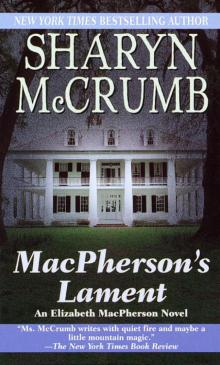 Elizabeth MacPherson 07 - MacPherson’s Lament
Elizabeth MacPherson 07 - MacPherson’s Lament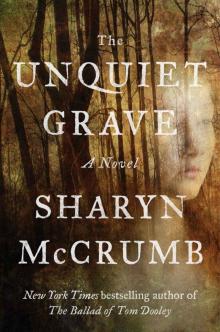 The Unquiet Grave: A Novel
The Unquiet Grave: A Novel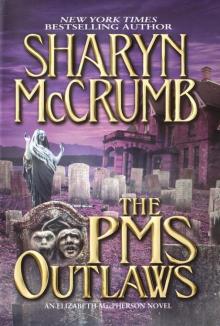 The PMS Outlaws: An Elizabeth MacPherson Novel
The PMS Outlaws: An Elizabeth MacPherson Novel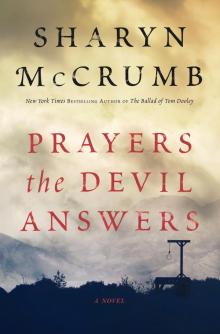 Prayers the Devil Answers
Prayers the Devil Answers Paying the Piper
Paying the Piper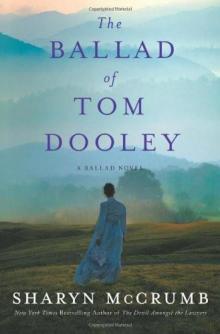 The Ballad of Tom Dooley: A Ballad Novel
The Ballad of Tom Dooley: A Ballad Novel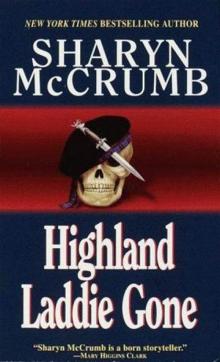 Highland Laddie Gone
Highland Laddie Gone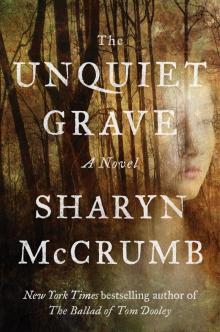 The Unquiet Grave
The Unquiet Grave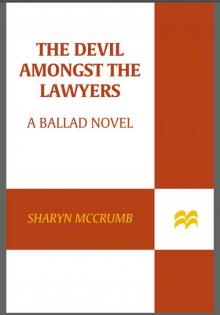 The Devil Amongst the Lawyers
The Devil Amongst the Lawyers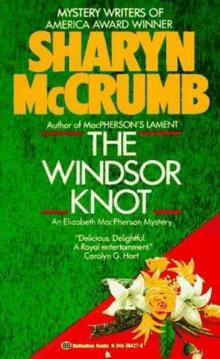 The Windsor Knot
The Windsor Knot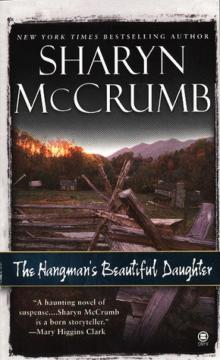 The Hangman's Beautiful Daughter
The Hangman's Beautiful Daughter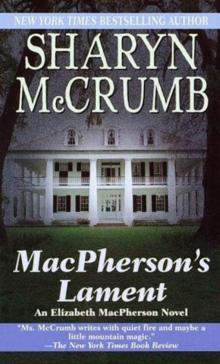 MacPherson's Lament
MacPherson's Lament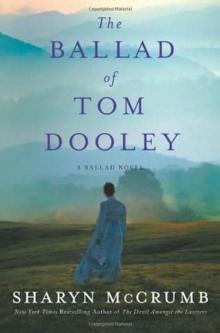 The Ballad of Tom Dooley
The Ballad of Tom Dooley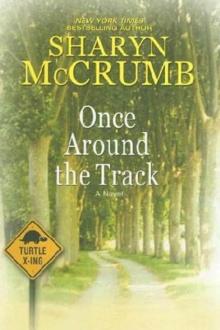 Once Around the Track
Once Around the Track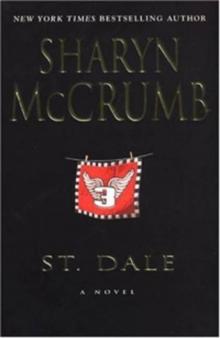 St. Dale
St. Dale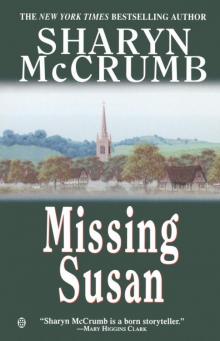 Elizabeth MacPherson 06 - Missing Susan
Elizabeth MacPherson 06 - Missing Susan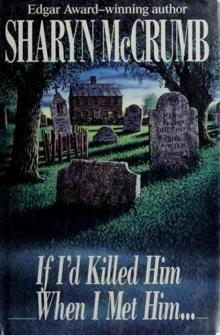 If I'd Killed Him When I Met Him…
If I'd Killed Him When I Met Him…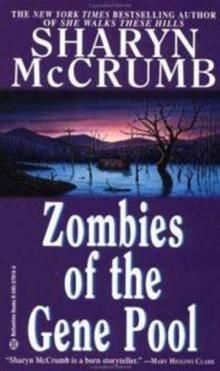 Zombies of the Gene Pool
Zombies of the Gene Pool Bimbos of the Death Sun
Bimbos of the Death Sun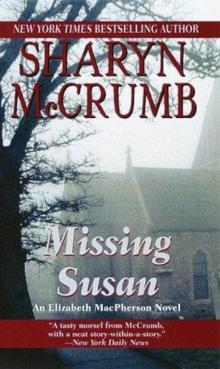 Missing Susan
Missing Susan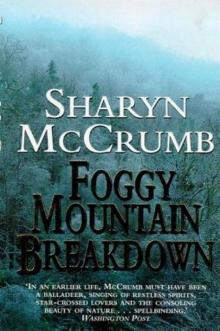 Foggy Mountain Breakdown and Other Stories
Foggy Mountain Breakdown and Other Stories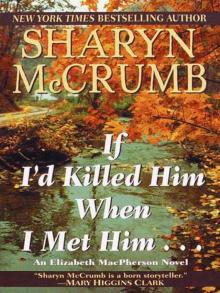 If I'd Killed Him When I Met Him
If I'd Killed Him When I Met Him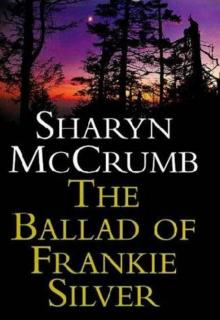 The Ballad of Frankie Silver
The Ballad of Frankie Silver Lovely In Her Bones
Lovely In Her Bones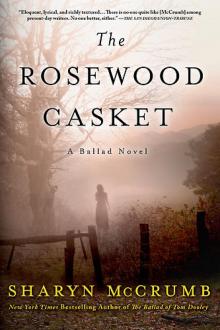 The Rosewood Casket
The Rosewood Casket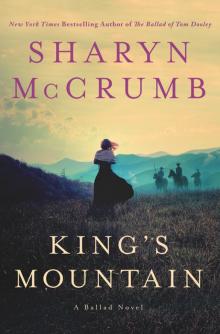 King's Mountain
King's Mountain